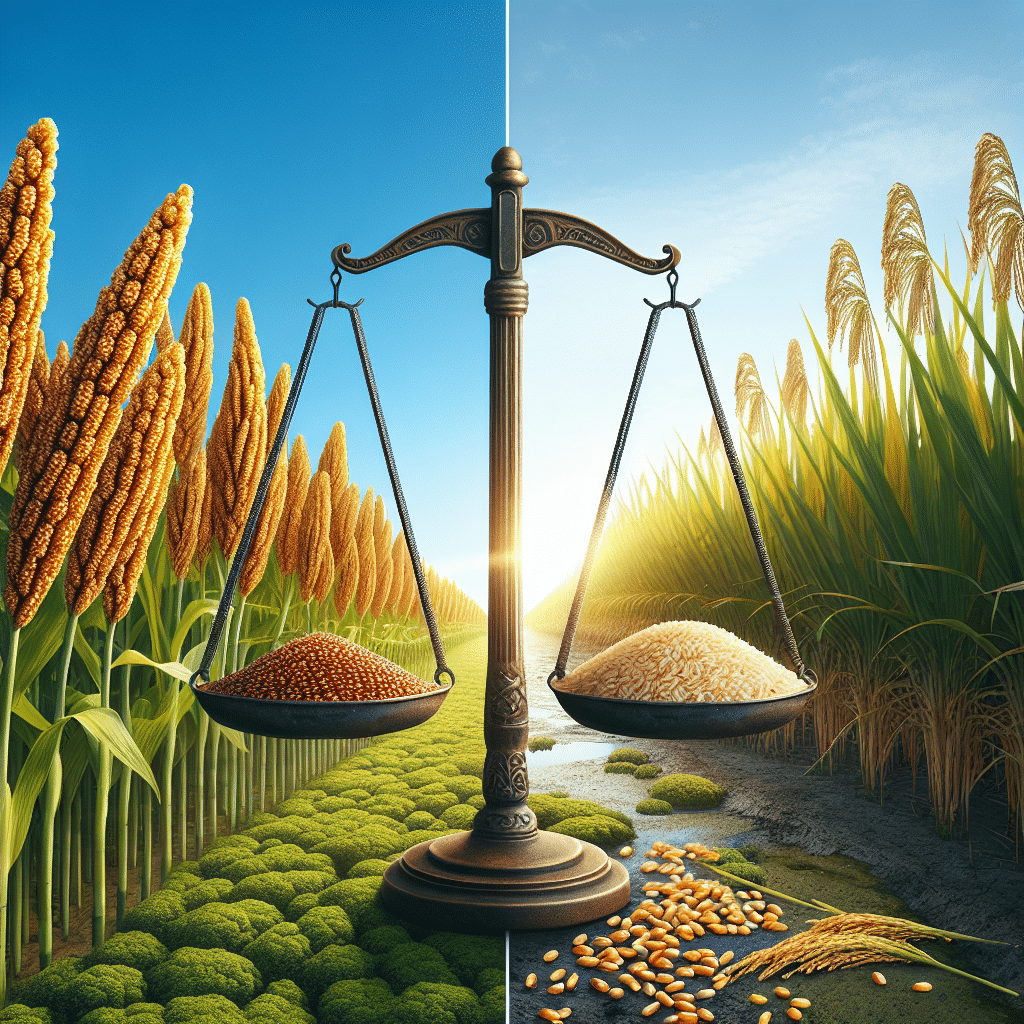Is Sorghum Better Than Rice?
-
Table of Contents
- Sorghum vs. Rice: Evaluating the Superior Grain for Health and Nutrition
- Nutritional Comparison of Sorghum and Rice
- Health Benefits of Sorghum
- Environmental and Economic Considerations
- Culinary Uses and Versatility
- Case Studies and Research
- Conclusion: Making the Right Choice for Your Diet
- Discover ETprotein’s High-Quality Protein Products
Sorghum vs. Rice: Evaluating the Superior Grain for Health and Nutrition

Grains are a staple in diets worldwide, providing essential nutrients and energy. Among the plethora of grains available, rice has traditionally been the go-to choice for many. However, sorghum, a lesser-known grain, is gaining attention for its potential health benefits. This article delves into the comparison between sorghum and rice, examining which grain might be the better choice for health-conscious consumers.
Nutritional Comparison of Sorghum and Rice
When comparing sorghum to rice, it’s essential to look at their nutritional profiles. Here’s a breakdown of what each grain has to offer:
- Calories: Sorghum and rice are similar in caloric content, making them both suitable for energy needs.
- Protein: Sorghum has a slightly higher protein content compared to white rice, which can be beneficial for muscle growth and repair.
- Fiber: Sorghum boasts a higher fiber content, which is crucial for digestive health and can aid in weight management.
- Vitamins and Minerals: Sorghum contains more B vitamins, iron, and antioxidants than white rice, contributing to overall health and well-being.
- Glycemic Index: Sorghum has a lower glycemic index than white rice, making it a better option for blood sugar control.
It’s important to note that brown rice, a whole grain, is nutritionally superior to white rice and closer to sorghum in terms of fiber and nutrients.
Health Benefits of Sorghum
Sorghum is not just nutritionally dense; it also offers several health benefits:
- Gluten-Free: Sorghum is naturally gluten-free, making it a safe choice for those with celiac disease or gluten intolerance.
- Antioxidant-Rich: The presence of antioxidants like phenolic compounds and flavonoids in sorghum helps combat oxidative stress and may reduce the risk of chronic diseases.
- Heart Health: The fiber in sorghum can help lower cholesterol levels, reducing the risk of heart disease.
- Diabetes Management: The lower glycemic index of sorghum helps maintain stable blood sugar levels, which is beneficial for individuals with diabetes.
Environmental and Economic Considerations
Beyond health, there are environmental and economic factors to consider when choosing between sorghum and rice:
- Water Usage: Sorghum requires significantly less water to grow than rice, making it a more sustainable choice in water-scarce regions.
- Pest Resistance: Sorghum is naturally more resistant to pests and diseases, reducing the need for chemical pesticides.
- Economic Impact: Sorghum is often grown in developing countries and can be a vital crop for supporting local economies and food security.
Culinary Uses and Versatility
Both sorghum and rice have versatile culinary uses. Rice is a well-known component in dishes like sushi, risotto, and paella. Sorghum, on the other hand, can be popped like popcorn, cooked into porridge, or used as a rice substitute in many recipes. Its mild flavor and chewy texture make it an excellent addition to salads, soups, and stews.
Case Studies and Research
Several studies have highlighted the benefits of sorghum. For instance, research published in the “Journal of Agricultural and Food Chemistry” found that sorghum bran has higher levels of antioxidants than other grains, which could have protective effects against certain diseases. Another study in the “American Journal of Clinical Nutrition” suggested that the consumption of whole grains like sorghum is associated with a lower risk of cardiovascular disease.
Conclusion: Making the Right Choice for Your Diet
In conclusion, while rice is a familiar and beloved grain worldwide, sorghum presents a compelling case for those seeking a nutritious alternative. With its higher protein and fiber content, lower glycemic index, and additional health benefits, sorghum is an excellent choice for health-conscious individuals. Moreover, its environmental resilience and economic importance make it a sustainable and ethical option.
Ultimately, the choice between sorghum and rice depends on personal dietary needs, culinary preferences, and environmental considerations. Both grains have their place in a balanced diet, but for those looking to make a change, sorghum is certainly worth exploring.
Discover ETprotein’s High-Quality Protein Products
If you’re interested in incorporating more plant-based proteins into your diet, ETprotein offers a range of high-quality protein products. Their selection includes organic rice protein, which can be an excellent addition to a variety of meals and snacks. ETprotein’s commitment to non-GMO, allergen-free products with high purity levels makes them a trusted choice for consumers looking to enhance their nutritional intake.
Whether you’re involved in sports nutrition, weight management, or simply seeking to improve your overall health, ETprotein’s products provide the protein boost you need. To learn more about their offerings or to sample their products, reach out to ETprotein and start experiencing the benefits of high-quality plant-based proteins today.
About ETprotein:
ETprotein, a reputable protein and L-(+)-Ergothioneine (EGT) Chinese factory manufacturer and supplier, is renowned for producing, stocking, exporting, and delivering the highest quality organic bulk vegan proteins and L-(+)-Ergothioneine. They include Organic rice protein, clear rice protein, pea protein, clear pea protein, watermelon seed protein, pumpkin seed protein, sunflower seed protein, mung bean protein, peanut protein, and L-(+)-Ergothioneine EGT Pharmaceutical grade, L-(+)-Ergothioneine EGT food grade, L-(+)-Ergothioneine EGT cosmetic grade, L-(+)-Ergothioneine EGT reference grade and L-(+)-Ergothioneine EGT standard. Their offerings, characterized by a neutral taste, non-GMO, allergen-free attributes, with L-(+)-Ergothioneine purity over 98%, 99%, cater to a diverse range of industries. They serve nutraceutical, pharmaceutical, cosmeceutical, veterinary, as well as food and beverage finished product distributors, traders, and manufacturers across Europe, USA, Canada, Australia, Thailand, Japan, Korea, Brazil, and Chile, among others.
ETprotein specialization includes exporting and delivering tailor-made protein powder and finished nutritional supplements. Their extensive product range covers sectors like Food and Beverage, Sports Nutrition, Weight Management, Dietary Supplements, Health and Wellness Products, and Infant Formula, ensuring comprehensive solutions to meet all your protein needs.
As a trusted company by leading global food and beverage brands and Fortune 500 companies, ETprotein reinforces China’s reputation in the global arena. For more information or to sample their products, please contact them and email sales(at)ETprotein.com today.












